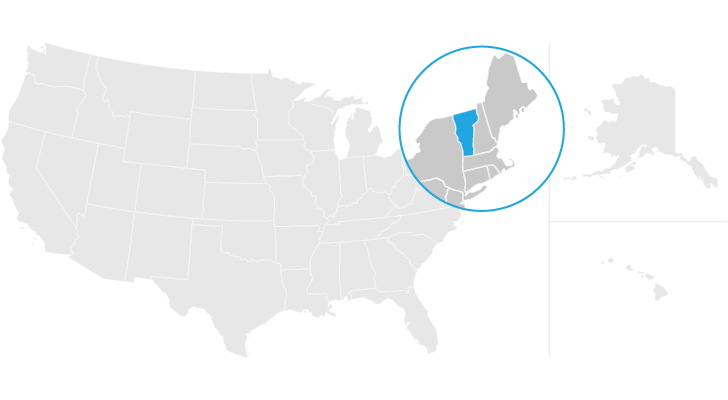Vermont is one of twelve states, plus Washington, D.C., that levies an estate tax. Unlike the other states, though, Vermont’s estate tax is flat. If your estate is worth more than the $5 million exemption, the state taxes the excess at a rate of 16%, with no progressive rates or tax brackets involved. If you are a resident of the Green Mountain State and you’re starting to think about estate planning, this guide will take you through what you need to know.
Do you need help with your estate plan? Speak with a financial advisor who serves your area today.
Vermont Estate Tax Exemption
The 2026 threshold for the Vermont estate tax is $5 million, and it has been since 2021. Estates worth less than this amount are not subject to the estate tax in the state of Vermont. The tax only applies to estates valued at more than the exemption. The first $5 million in an estate is exempt and is not subject to the estate tax.
Vermont Estate Tax Rate
While many estate taxes are progressive, Vermont’s is flat. The state charges a flat rate of 16%. Let’s say your total estate is worth $7.25 million. The first $5 million is exempt, leaving a taxable estate of $2.25 million. That money is taxed at a rate of 16%, giving you a total estate tax burden of $360,000 in Vermont.
Vermont includes any gifts given within the past two years as part of the taxable estate.
What Is the Estate Tax?
The estate tax, sometimes referred to as the “death tax,” is a tax on the estate of a person who recently died. It is levied on the money or assets in an estate before it is passed on to a person’s designated heirs. The estate tax only applies to estates that reach a certain threshold.
The estate tax is different from the inheritance tax. The inheritance tax is levied by some states on money or property after it’s dispersed to beneficiaries.
Vermont Inheritance Tax

Vermont has no inheritance tax, but inheritance taxes from others states could in theory apply to you. Kentucky, for example, has an inheritance tax that applies to all property within the state, even if it is passed on to an inheritor who lives out of state. If you inherit assets from someone living in another state, check the local laws to see if you’ll owe taxes.
Vermont Gift Tax
There is no gift tax in Vermont. The federal gift tax has a $19,000 exemption per recipient in 2026. That means you can give up to $19,000 to as many people as you want in 2026 without worrying about the gift tax. You must report any gifts to a person that are above that amount in a given year. The excess counts against your lifetime gift tax exemption of $15 million and reduces your federal estate tax exemption, as of 2026.
Vermont Estate Tax for Married Couples
The Vermont estate tax exemption is not portable for married couples. If your spouse dies before you do, you still will only get to apply one $5 million exemption.
Federal Estate Tax
In addition to the Vermont estate tax, some Vermont residents may need to consider the federal estate tax, which has a much higher threshold. The threshold for the federal estate tax is $15 million for deaths in 2026, up from $13.99 million for deaths in 2025. Any estate worth less than that is not subject to the federal estate tax. The federal exemption is portable, meaning a married couple can protect up to $30 million in 2026.
Unlike the Vermont estate tax, the federal estate tax is progressive. Tax rates increase the larger the estate.
Here’s how it works: Let’s say you have an estate worth $17.82 million and you are not married. First, subtract the $15 million exemption, leaving a taxable estate of $2.82 million. That puts you in the top tax bracket, so you’ll owe $345,800 on the first $1 million. You’ll also owe 40% on the remaining $940,000, which comes to $376,000. Add that to the base rate and you have a total estate tax burden of $721,800.
Federal Estate Tax Rates
| Taxable Estate* | Base Taxes Paid | Marginal Rate | Rate Threshold** |
| $1 – $10,000 | $0 | 18% | $1 |
| $10,000 – $20,000 | $1,800 | 20% | $10,000 |
| $20,000 – $40,000 | $3,800 | 22% | $20,000 |
| $40,000 – $60,000 | $8,200 | 24% | $40,000 |
| $60,000 – $80,000 | $13,000 | 26% | $60,000 |
| $80,000 – $100,000 | $18,200 | 28% | $80,000 |
| $100,000 – $150,000 | $23,800 | 30% | $100,000 |
| $150,000 – $250,000 | $38,800 | 32% | $150,000 |
| $250,000 – $500,000 | $70,800 | 34% | $250,000 |
| $500,000 – $750,000 | $155,800 | 37% | $500,000 |
| $750,000 – $1 million | $248,300 | 39% | $750,000 |
| Over $1 million | $345,800 | 40% | $1 million |
*The taxable estate is the total above the 2026 exemption of $15 million.
**The rate threshold is the point at which the marginal estate tax rate kicks in.
Overall Vermont Tax Picture

Vermont is not very tax-friendly for retirees. The state fully taxes income from both retirement accounts like 401(k) plans and public and private pension plans. Vermont taxes Social Security benefits if federal taxes also apply. In general, Social Security benefits are subject to federal taxes if you have other sources of income as well.
Vermont has a progressive income tax, with rates ranging from 0% to 8.75%. Vermont’s property taxes are among the highest in the country, with an average effective rate of 1.42%.
Estate Planning Tips
- Estate planning can be complex, so a financial advisor’s services could be helpful. Finding a financial advisor doesn’t have to be hard. SmartAsset’s free tool matches you with vetted financial advisors who serve your area, and you can have a free introductory call with your advisor matches to decide which one you feel is right for you. If you’re ready to find an advisor who can help you achieve your financial goals, get started now.
- One of the most common will-writing mistakes is to not accurately take stock of your assets. Consider everything, from bank accounts and homes to less obvious items like family heirlooms and jewelry.
Photo credit: ©iStock.com/DenisTangneyJr, ©iStock.com/kate_sept2004, SmartAsset
